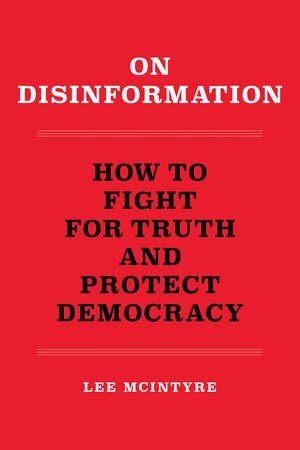A Guide to Identifying Misinformation
Having the world at your fingertips is quite the privilege. From grocery delivery to the ability to see your family, with a few clicks almost anything is possible. Therein lies the issue. With so much information available, it is easy to fall down a rabbit hole of misinformation and propaganda. We’re here to help. Libraries exist to help you access the resources you need to stay well-informed in a time where misinformation runs rampant. When you hold enough knowledge to stand strongly in your own opinions, you maintain your ability to stand in your power.
Here at the Rochelle Park Free Public Library, we have two new books that address the effect misinformation and propaganda has on our society.
On Disinformation: How to Fight For Truth and Protect Democracy by Lee C. McIntyre
McIntyre’s On Disinformation: How To Fight For Truth and Protect Democracy addresses misinformation in the media from all sides of the political spectrum. It gives everyday citizens the tools to spot misinformation and propaganda. It urges people to resist polarization and black and white thinking while urging them to pressure our congressional and government leaders to regulate the spread of misinformation on social media.
2. Opinions by Roxane Gay
Opinions by Roxane Gay is a collection of just that – opinions. Gay is a celebrated memoirist with best sellers like Hunger and Bad Feminist under her belt. Opinions offers a collection of essays where Gay comments on pressing social issues, the increasingly hostile political climate, and pop culture. It is an interesting collection that threads the needle between each section; how does the media affect our political views? How does our pop culture reflect our day-to-day realities? Entertainment and political movements are intrinsically linked, and Gay provides witty, fact-based commentary on all of it. This novel is a must-have in the age of misinformation as it emphasizes the importance of media literacy and analysis. Building this skillset helps people identify propaganda within the media they consume on a daily basis.
In addition to what we have available in our library, here is a general guide to independent research, which will help you identify bias and misinformation in your favorite news outlet or social media feed:
Consider The Source
When reviewing any source, whether it’s a book or an online publication, it is important to know who the author is and what the source’s purpose is. You can do this by quickly searching the author’s name or the web publication. The results will typically indicate biases and affiliations.
Read Beyond The Headline
While most mainstream news publications vet their sources, they are not immune to writing outrageous headlines in order to generate clicks. Some of these headlines can be misleading. Make sure you read the entire article to get the full scope of the situation.
Consider the Supporting Sources
Most authors and publications will include the sources for their work within their books and articles. Click on them! Read them! Understand how they drew those conclusions. If there aren’t any sources, reconsider the trustworthiness of the work.
Consider Your Reaction
One of the greatest signifiers of an unreliable source is how it makes you feel. Are the claims outlandish and inflammatory? Do you want to scream at the screen? That’s intentional, and likely propaganda. While some things in the news are devastating, reliable sources would not be appealing solely to its readers' emotions, and would instead encourage you to form your own opinion based on the evidence.
In an age where everyone has an opinion on everything, it is important to know not only what to trust, but why you trust it. Between the thousands of books available on BCCLS and access to the internet within libraries, it is possible to conduct your own research and stay well informed for free. While it can be overwhelming at first, your library is here for you every step of the way.
If you’re interested in learning more about how to spot misinformation, check out these cool sources!
https://www.lib.sfu.ca/help/research-assistance/fake-news
https://www.jasonluther.net/fakenews/


